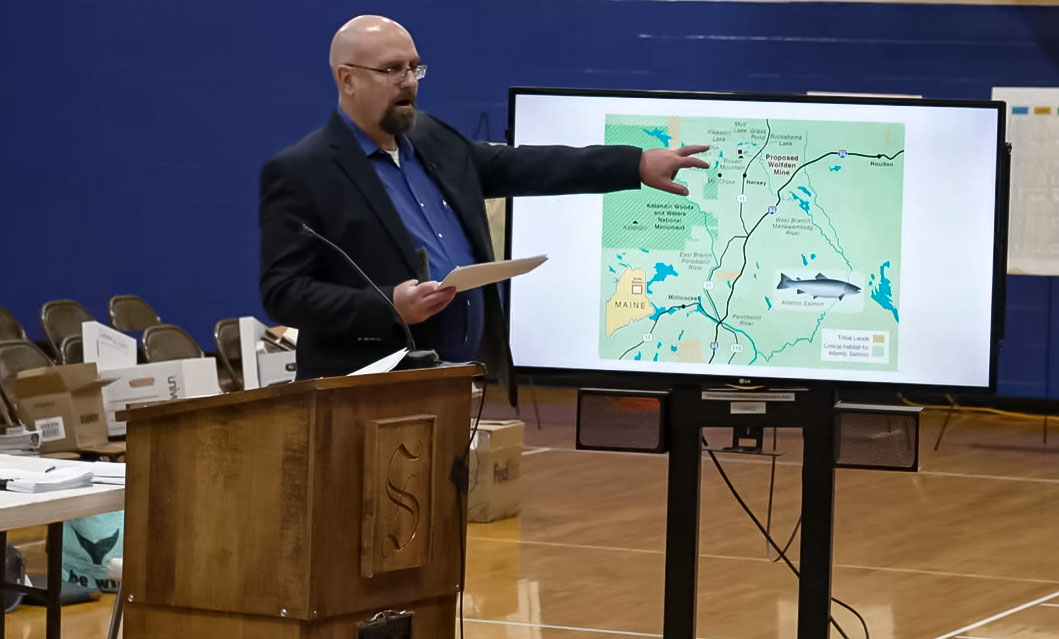
BREWER, Maine — Members of the Land Use Planning Commission questioned a Canadian mining company’s finances and its plan to excavate metallic minerals in the middle of the state’s waters and wildlife habitat.
Commissioners deliberated Wednesday at Jeff’s Catering in Brewer following 11 months of document gathering, public comment and four days of public hearings on Wolfden’s application to change the zoning for 374 acres at Pickett Mountain in northern Penobscot County for a proposed underground metallic mineral mine. The deliberations were held to provide guidance to LUPC staff who will draft a recommendation to either approve or deny the application.
The zoning change, from limited use to industrial use, would allow Wolfden to apply with the Maine Department of Environmental Protection for a state mining permit. Without the commission’s approval, Wolfden can’t proceed with its plans to mine minerals like zinc, copper and lead at Pickett Mountain.
Commissioner Gwen Hilton said that her overriding concern is she has seen no evidence or examples of Wolfden mines that are high quality developments and not detrimental to the environment.
“I don’t think that they have shown that this is financially practicable at this location. It’s really about this location and the resources that are there,” she said. “This particular location is really very sensitive and we have to be really careful. I don’t want to see any kind of pollution there.”
The eight-member commission is charged with determining if the Wolfden project is financially sound, its effect on the region’s socioeconomics, wildlife resources and habitats, natural character, historical and cultural resources and tribal impact, and water and fish resources and aquatic habitat. One commissioner, Everett Worcester, who chaired all previous sessions and the public hearings, was absent from the meeting.
The next steps include LUPC staff consideration of the commissioners deliberations, LUPC senior planner Tim Carr said. The LUPC staff will create a draft decision document to present to the commission for a final decision in February.
Carr asked the commissioners if Wolfden’s preliminary economic assessment was the appropriate level of information in determining the project’s financial viability. The PEA is part of the Wolfden rezoning application.
“I think there is an issue with using the preliminary economic assessment. I don’t think it’s the appropriate level of information for financial practicability,” Commissioner Millard Billings said. “I think the PEA is more a sales pitch for a junior developer trying to sell the project to get a major developer to get on board and make it look like a viable project.”
Other Commissioners expressed similar reactions to the PEA.
During October public hearings, those opposed to Wolfden’s rezoning request pointed to its financial instability and Wolfden CEO Ron Little said during that same hearing that Wolfden has never operated a mine and that they do not know if they will have the financial resources to complete the project.
To further complicate the financial issue, because of fluctuations in the metallic minerals market, they will never know, in advance, the value of the minerals extracted, said Commissioner Perry Ellsworth.
Additionally, Wolfden auditors said that material uncertainties cast significant doubt on the Corporation’s ability to stay in business.
“The amount of money currently in their accounts, based on their financials, certainly will not cover the requirements or concerns being noted as of now,” Commissioner Leo Trudell said. “How are the risks going to be mitigated in the planning process? If it doesn’t work on paper, then it’s not going to work in real life.”
Regarding the socioeconomic impact, some commissioners questioned Wolfden’s promise of local jobs, pointing out that a mining operation is very different from paper mills, for example. The mills come into a community and stay a while, use local resources and hire local workers.
“That’s not what we have here. We have a business that’s going to be here for a little while and then they are gone and I am suspect of the use of local workers,” said Hilton, giving examples of businesses using contract labor. “I am skeptical about the job creation aspect of this.”
Trudell said that the mine does not have long-term sustainability like the lumber industry.
“Since those jobs are not sustainable in the longer term, the resources that are at risk should be taken into consideration,” he said.
Regarding natural resources and habitat, Commissioners talked about respecting the earth and lands from a recreational aspect and longer term development.
“Potential impact on the wildlife habitat has got to be given the heaviest weight that we could possibly imagine. Once something goes wrong, we can’t unring the bell no matter how much money they put into a financial trust to solve the problem,” Billings said. “If the poison has leached out. It’s too late. We’ve impacted the natural environment, all the wildlife and the citizens of the area. The financial impact is like locking the barn door after the horse got out.”







